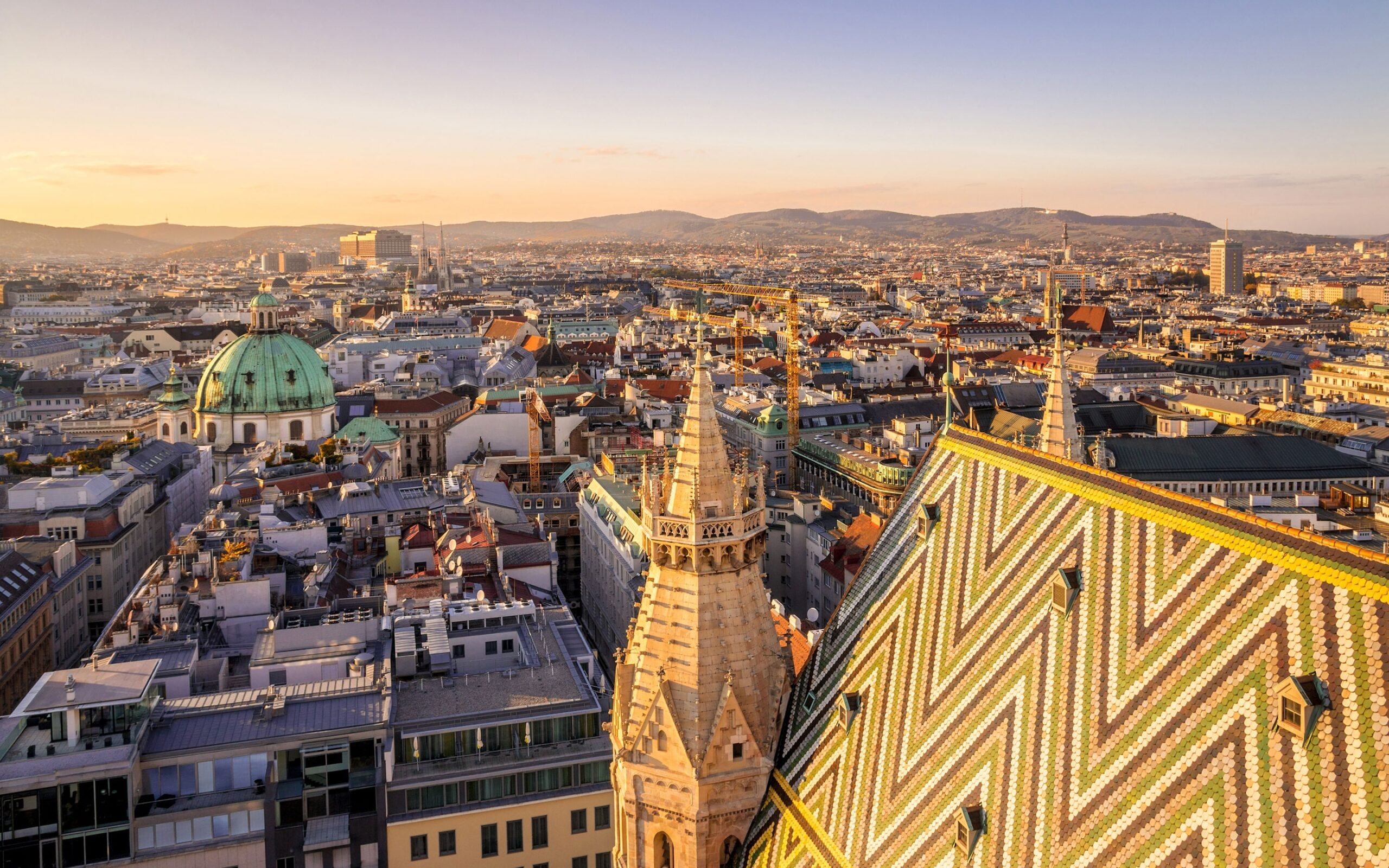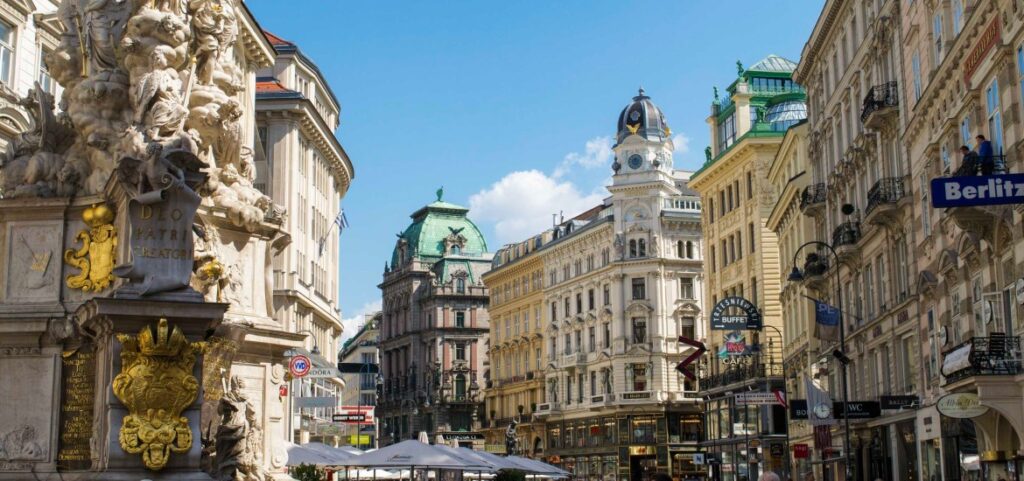Vienna is the national capital, largest city, and one of nine states of Austria. Vienna is Austria’s most populous city, with about 1.9 million inhabitants and its cultural, economic, and political center. It is the 6th-largest city by population within city limits in the European Union.
| • Capital city and state | 414.78 km2 (160.15 sq mi) |
|---|---|
| • Land | 395.25 km2 (152.61 sq mi) |
| • Water | 19.39 km2 (7.49 sq mi) |
| Population (2018-01-01) | |
|---|---|
| • Capital city and state | 1,888,776 |
| • Rank | 1st in Austria (6th in EU) |
| • Density | 4,326.1/km2 (11,205/sq mi) |
| • Metro | 2,600,000 |
| • Ethnicity | 61.2% Austrian38.8% Other |
Economy
Vienna is one of the wealthiest regions in the European Union: Its gross regional product of EUR 47,200 per capita constituted 25.7% of Austria’s GDP in 2013. It amounts to 159% of the EU average. The city improved its position from 2012 on the ranking of the most economically powerful cities reaching number nine on the listing in 2015.
Altogether, approximately 8,300 new companies have been founded in Vienna every year since 2004. The majority of these companies are operating in fields of industry-oriented services, wholesale trade as well as information and communications technologies and new media. Vienna makes effort to establish itself as a start-up hub.
The Viennese sector for information and communication technologies is comparable in size with the sector in Helsinki, Milan or Munich and thus among Europe’s largest IT locations. In 2012 8,962 IT businesses with a workforce of 64,223 were located in the Vienna Region. The main products are instruments and appliances for measuring, testing and navigation as well as electronic components. More than ⅔ of the enterprises provide IT services. Among the biggest IT firms in Vienna are Kapsch, Beko Engineering & Informatics, air traffic control experts Frequentis, Cisco Systems Austria, Hewlett-Packard, Microsoft Austria, IBM Austria and Samsung Electronics Austria.[107][108]
The US technology corporation Cisco runs its Entrepreneurs in Residence program for Europe in Vienna in cooperation with the Vienna Business Agency.
The British company UBM has rated Vienna one of the Top 10 Internet Cities worldwide, by analyzing criteria like connection speed, WiFi availability, innovation spirit and open government data.
Tourism and conferences
There were 14.96 million overnight stays in Vienna in 2016 (+4.4% compared to 2015). In 2014, 6.2 million tourists visited Vienna and amounted to 13,524,266 overnight stays. The main markets for tourists are Germany, the United States, Italy and Russia. Between 2005 and 2013, Vienna was the world’s number one destination for international congresses and conventions. In 2014, 202 international conferences were held in Vienna, making it the second most popular congress location worldwide according to the statistics of the International Congress and Convention Association. Its largest conference center, the Austria Center Vienna (ACV) has a total capacity for around 20,000 people and is situated next to the United Nations Headquarters in Vienna. Other centers are the Messe Wien Exhibition & Congress Center (up to 3,300 people) and the Hofburg Palace (up to 4,900 people).
Music, theater and opera

Musical luminaries including Wolfgang Amadeus Mozart, Joseph Haydn, Ludwig van Beethoven, Ferdinand Ries, Franz Schubert, Johannes Brahms, Gustav Mahler, Robert Stolz, and Arnold Schoenberg have worked there.
Art and culture had a long tradition in Vienna, including theater, opera, classical music and fine arts. The Burgtheater is considered one of the best theaters in the German-speaking world alongside its branch, the Akademietheater. The Volkstheater Wien and the Theater in der Josefstadt also enjoy good reputations. There is also a multitude of smaller theaters, in many cases devoted to less mainstream forms of the performing arts, such as modern, experimental plays or cabaret.
Vienna is also home to a number of opera houses, including the Theater an der Wien, the Staatsoper and the Volksoper, the latter being devoted to the typical Viennese operetta. Classical concerts are performed at venues such as the Wiener Musikverein, home of the Vienna Philharmonic Orchestra known across the world for the annual widely broadcast „New Year’s Day Concert“, as well as the Wiener Konzerthaus, home of the internationally renowned Vienna Symphony. Many concert venues offer concerts aimed at tourists, featuring popular highlights of Viennese music, particularly the works of Wolfgang Amadeus Mozart, Johann Strauss I, and Johann Strauss II.
Parks and gardens

Vienna possesses many parks, including the Stadtpark, the Burggarten, the Volksgarten (part of the Hofburg), the Schlosspark at Schloss Belvedere (home to the Vienna Botanic Gardens), the Donaupark, the Schönbrunner Schlosspark, the Prater, the Augarten, the Rathauspark, the Lainzer Tiergarten, the Dehnepark, the Resselpark, the Votivpark, the Kurpark Oberlaa, the Auer-Welsbach-Park and the Türkenschanzpark. Green areas include Laaer-Berg (including the Bohemian Prater) and the foothills of the Wienerwald, which reaches into the outer areas of the city. Small parks, known by the Viennese as Beserlparks, are everywhere in the inner city areas.
Many of Vienna’s parks include monuments, such as the Stadtpark with its statue of Johann Strauss II, and the gardens of the baroque palace, where the State Treaty was signed. Vienna’s principal park is the Prater which is home to the Riesenrad, a Ferris wheel, and Kugelmugel, a micronation the shape of a sphere. The imperial Schönbrunn’s grounds contain an 18th-century park which includes the world’s oldest zoo, founded in 1752. The Donauinsel, part of Vienna’s flood defenses, is a 21.1 km (13.1 mi) long artificial island between the Danube and Neue Donau dedicated to leisure activities.
Tourist attractions
Major tourist attractions include the imperial palaces of the Hofburg and Schönbrunn (also home to the world’s oldest zoo, Tiergarten Schönbrunn) and the Riesenrad in the Prater. Cultural highlights include the Burgtheater, the Wiener Staatsoper, the Lipizzaner horses at the spanische Hofreitschule, and the Vienna Boys‘ Choir, as well as excursions to Vienna’s Heurigen district Döbling.

There are also more than 100 art museums, which together attract over eight million visitors per year.[150] The most popular ones are Albertina, Belvedere, Leopold Museum in the Museumsquartier, KunstHausWien, Bank Austria Kunstforum, the twin Kunsthistorisches Museum and Naturhistorisches Museum, and the Technisches Museum Wien, each of which receives over a quarter of a million visitors per year.[151]
There are many popular sites associated with composers who lived in Vienna including Beethoven’s various residences and grave at Zentralfriedhof (Central Cemetery) which is the largest cemetery in Vienna and the burial site of many famous people. Mozart has a memorial grave at the Habsburg gardens and at St. Marx cemetery (where his grave was lost). Vienna’s many churches also draw large crowds, famous of which are St. Stephen’s Cathedral, the Deutschordenskirche, the Jesuitenkirche, the Karlskirche, the Peterskirche, Maria am Gestade, the Minoritenkirche, the Ruprechtskirche, the Schottenkirche, St. Ulrich and the Votivkirche.
Modern attractions include the Hundertwasserhaus, the United Nations headquarters and the view from the Donauturm.
The Organisation of the Vienna City Administration
Vienna is one of Austria’s federal provinces, as well as the federal capital city and the largest municipality of the Republic of Austria. Proper administration is ensured by a number of constitutionally required bodies.
City Government
- Mayor and Governor of Vienna: Michael Ludwig
- Deputy Mayor and Deputy Governor, Executive City Councillor for Housing, Housing Construction, Urban Renewal and Women’s Issues: Kathrin Gaal
- Deputy Mayor and Deputy Governor, Executive City Councillor for Education, Youth, Integration and Transparency: Christoph Wiederkehr
- Executive City Councillor of Finance, Business, Labour, International Affairs and Vienna Public Utilities: Peter Hanke
- Executive City Councillor for Social Affairs, Public Health and Sports: Peter Hacker
- Executive City Councillor for Executive City Councillor for Innovation, Urban Planning and Mobility: Ulli Sima
- Executive City Councillor for Climate, Environment, Democracy and Personnel: Jürgen Czernohorszky
- Executive City Councillor for Cultural Affairs and Science: Veronica Kaup-Hasler











